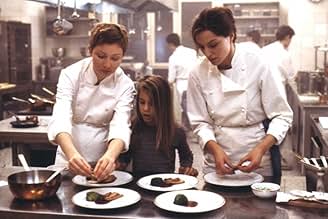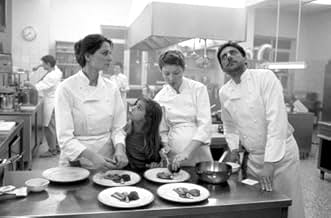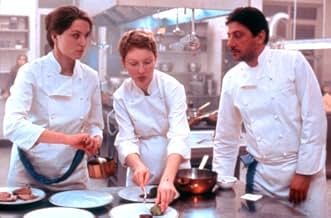IMDb RATING
7.2/10
8.7K
YOUR RATING
When a headstrong chef takes charge of her equally stubborn 8-year-old niece, the tensions between them mount... until an Italian sous-chef arrives to lighten the mood.When a headstrong chef takes charge of her equally stubborn 8-year-old niece, the tensions between them mount... until an Italian sous-chef arrives to lighten the mood.When a headstrong chef takes charge of her equally stubborn 8-year-old niece, the tensions between them mount... until an Italian sous-chef arrives to lighten the mood.
- Awards
- 14 wins & 7 nominations total
Wolf-Dietrich Sprenger
- Lauter Gast
- (as W.D. Sprenger)
Victoria Trauttmansdorff
- Begleiterin
- (as Victoria von Trautmannsdorf)
Jerome Ducornau
- Jean
- (as Jerome Ducournau)
- Director
- Writer
- All cast & crew
- Production, box office & more at IMDbPro
Featured reviews
(spoiler regarding the general plot)
Bella Martha reminds me of About A Boy, the "no man is an island" aspect of it. In some ways, Martha is like the guy played by Hugh Grant. The difference though is that while he apparently is really happy about the state of affairs, i.e. the isolation, she is not (even if she may not be fully aware of her own unhappiness). She has to visit a therapist regularly, although she claims that this is purely on instruction of her boss. I call this visit the first of the four "relationships" just to make the number sound more interesting.
The other three relationship all start to develop quite early in the film. First, a neighbour moves in, a gentlemanly engineer called Sam. Then in her "office" i.e. the kitchen of a restaurant where she is the chef, a chap called Mario is brought in by her boss as temporary relief for her assistant on maternity leave. Finally, death of her single-parent sister in an accident left her taking care of her eight-year-old niece Lina while they search her father in Italy.
The first half of the film developed these three relationships along the two fronts: home and office. Soon, it is clear that Sam's role is not really significant, serving just as a dependable friend and emergency-baby-sitter. On the other hand, rocky starts of the other two relationships smooth out as the two fronts merge. Lina comes to the restaurant kitchen in the evenings, becoming a darling there, while Mario becomes a family friend and Lina's buddy, and the three look just like a family. We begin to see smiles on Martha's face.
As in similar movies, just after the mid-point, when characters are well developed and things go nicely, conflicts occur. What I found is that the hostility of Lina towards Martha is less than convincing, even if we take into account her possible rejection of Martha as a mother-substitution. The eventual reconciliation also comes a little too easily. The other conflicts, on which I won't go into details, are not that well developed.
But that is exactly the main point. This is not a Hollywood movie with the standard formula of powerful dramatic conflicts and climatic tear-jerking conclusions. This point is well made when we see the ending of the story given to us quite casually as part of the credit roll. Oh yes, there's a concluding scene with the therapist, reminding us of the sense of humour that comes as part of the film.
Smooth jazz (not sure if that's the right terminology) has been used throughout the film, at the right times, enhancing it rather than distracting from it.
Finally, I really love the scenes in the kitchen which is Martha's entire universe at the beginning of the film, as well as where her reconciliation with both Mario and Lina first takes place. The story aside, I really enjoy the operation in the kitchen, which is the exact opposite to the mass production lines brought about by the industrial revolution. Here, in Martha's kitchen, things are done with what I can only describe as artistic flair.
Bella Martha reminds me of About A Boy, the "no man is an island" aspect of it. In some ways, Martha is like the guy played by Hugh Grant. The difference though is that while he apparently is really happy about the state of affairs, i.e. the isolation, she is not (even if she may not be fully aware of her own unhappiness). She has to visit a therapist regularly, although she claims that this is purely on instruction of her boss. I call this visit the first of the four "relationships" just to make the number sound more interesting.
The other three relationship all start to develop quite early in the film. First, a neighbour moves in, a gentlemanly engineer called Sam. Then in her "office" i.e. the kitchen of a restaurant where she is the chef, a chap called Mario is brought in by her boss as temporary relief for her assistant on maternity leave. Finally, death of her single-parent sister in an accident left her taking care of her eight-year-old niece Lina while they search her father in Italy.
The first half of the film developed these three relationships along the two fronts: home and office. Soon, it is clear that Sam's role is not really significant, serving just as a dependable friend and emergency-baby-sitter. On the other hand, rocky starts of the other two relationships smooth out as the two fronts merge. Lina comes to the restaurant kitchen in the evenings, becoming a darling there, while Mario becomes a family friend and Lina's buddy, and the three look just like a family. We begin to see smiles on Martha's face.
As in similar movies, just after the mid-point, when characters are well developed and things go nicely, conflicts occur. What I found is that the hostility of Lina towards Martha is less than convincing, even if we take into account her possible rejection of Martha as a mother-substitution. The eventual reconciliation also comes a little too easily. The other conflicts, on which I won't go into details, are not that well developed.
But that is exactly the main point. This is not a Hollywood movie with the standard formula of powerful dramatic conflicts and climatic tear-jerking conclusions. This point is well made when we see the ending of the story given to us quite casually as part of the credit roll. Oh yes, there's a concluding scene with the therapist, reminding us of the sense of humour that comes as part of the film.
Smooth jazz (not sure if that's the right terminology) has been used throughout the film, at the right times, enhancing it rather than distracting from it.
Finally, I really love the scenes in the kitchen which is Martha's entire universe at the beginning of the film, as well as where her reconciliation with both Mario and Lina first takes place. The story aside, I really enjoy the operation in the kitchen, which is the exact opposite to the mass production lines brought about by the industrial revolution. Here, in Martha's kitchen, things are done with what I can only describe as artistic flair.
Greetings again from the darkness. Nothing (well very few things) irritates me more than a marketing campaign that misrepresents the movie. The trailer I saw 2 months ago, led me to believe that this was a comedy, in fact, almost a slapstick comedy. PLEASE don't go to this movie expecting a comedy. There are a few laughs, but mostly just a few smiles and chuckles. This wonderful film offers so much other than comedy. Veteran German actress Martina Gedeck is just outstanding as Martha - a beautiful woman comfortable only while cooking ... and then just barely. Most of the movie deals with Martha's struggle at being a mom to her 8 year old niece AND having to share her kitchen with a talented "Italian" chef. Watching these 3 grow is painful, yet fulfilling. Watch for the changes in Martha's approach to food and life as Mario shows her the warmth and emotions of both. This is a coming of age film for an older woman. "My Big Fat Greek Wedding" had been my favorite little movie of the year. Now it is not so little, and "Mostly Martha" may be every bit as good. Just don't expect a laugh out loud comedy.
This film is an excellent psychological study of a VERY controlled and emotionally constricted woman who uses food, believe it or not, as a way of avoiding intimacy. She is a superb chef who is incredibly precise and demanding concerning her cooking because she is so uncomfortable with people. However, into her tightly controlled world comes chaos in the form of her niece--whose mother was just killed in an auto accident. Not surprisingly, she has a hard time relating to this child and I was thrilled that her transformation to a whole person took time and wasn't achieved in a Hollywood-style way. Instead, this little girl (who was not overly cute or fake--thank goodness) and a new chef at her restaurant (who was completely unlike her) influence Martha in a way that is believable and satisfying.
By the way, while not quite as good as The Big Night (which came out the same year) or Babette's feast, this movie is VERY reminiscent of them--elevating food to a true work of art.
By the way, while not quite as good as The Big Night (which came out the same year) or Babette's feast, this movie is VERY reminiscent of them--elevating food to a true work of art.
A strange thing about the food: some of it, like the bird-cooked-in-pig's-bladder which Martha describes in loving detail in order to have something to talk about while she's with her therapist, sounds good, and perhaps even looks good, without being in the least bit appetising. You'd have to be mad to actually eat anything that's been cooked in a pig's bladder. But Martha is probably right aesthetically, if not in any other way: if she says the best way to cook the bird is in a pig's bladder, then you'd better believe it.
Martha is a superb creation. She's a good chef. (She may be the best chef of any film ever made.) When her boss sends her to a therapist, she talks about food and cooking, which interest her, rather than about herself, which doesn't interest her. She goes to therapy because her boss orders her to, and when her therapist (who's no fool either) asks her why she thinks her boss orders her to, she says, as though considering the question for the first time, that she doesn't know and she clearly doesn't care, either.
When various people (her orphaned niece, an Italian cook) come along to disrupt her life, we're on her side in wanting her to retain control; and although these likable people DO successfully disrupt her life, she does successfully retain control; so everyone wins. And it's hard not to admire someone who can not only insult the philistines who eat at the restaurant where she works but who know how to do so properly. These people don't know how good they have it. I'd rather be insulted by her than flattered by some spineless flunky.
The script, word for word, and moment for moment, is as perfectly judged as one of Martha's dishes. The IMDb user who says of Lina: "She didn't cry when her mother died, but she was really upset when Martha forgot to pick her up. It wasn't her fault, it was the script's" merely shows how much his sensibilities have been coarsened by Hollywood cliché. In fact, the film shows genuine insight into the way people naturally react, not the way lazy screenwriters would like to train them to react. Lina reacts to her mother's death not with the usual screen histrionics but by not eating. Tears are reserved (as they are in life) for less important misfortunes.
This is an assured, intelligent, charming film. Even the use of music shows an unerring touch. I'm eager to see what Sandra Nettelbeck does next.
Martha is a superb creation. She's a good chef. (She may be the best chef of any film ever made.) When her boss sends her to a therapist, she talks about food and cooking, which interest her, rather than about herself, which doesn't interest her. She goes to therapy because her boss orders her to, and when her therapist (who's no fool either) asks her why she thinks her boss orders her to, she says, as though considering the question for the first time, that she doesn't know and she clearly doesn't care, either.
When various people (her orphaned niece, an Italian cook) come along to disrupt her life, we're on her side in wanting her to retain control; and although these likable people DO successfully disrupt her life, she does successfully retain control; so everyone wins. And it's hard not to admire someone who can not only insult the philistines who eat at the restaurant where she works but who know how to do so properly. These people don't know how good they have it. I'd rather be insulted by her than flattered by some spineless flunky.
The script, word for word, and moment for moment, is as perfectly judged as one of Martha's dishes. The IMDb user who says of Lina: "She didn't cry when her mother died, but she was really upset when Martha forgot to pick her up. It wasn't her fault, it was the script's" merely shows how much his sensibilities have been coarsened by Hollywood cliché. In fact, the film shows genuine insight into the way people naturally react, not the way lazy screenwriters would like to train them to react. Lina reacts to her mother's death not with the usual screen histrionics but by not eating. Tears are reserved (as they are in life) for less important misfortunes.
This is an assured, intelligent, charming film. Even the use of music shows an unerring touch. I'm eager to see what Sandra Nettelbeck does next.
8=G=
"Mostly Martha" is a thoroughly delightful tale of a comely, self contained, socially unassured, and occasionally gauche German master chef, Martha (Gedeck), in need of a recipe for living who finds love through tragedy and romance through cooking. In thinking about these comments I concluded that there is nothing I would change about this film except the language (I don't speak German). A perfect little gem, "Mostly Martha" is the kind of flick which makes you feel sorry for those who won't watch foreign films because of subtitles and wonder why audiences dine voraciously on cinematic junk food when such palate pleasers as this are not only delicious but nutritious. (A-)
Did you know
- TriviaSergio Castellitto's German wasn't good enough so Frank Glaubrecht was brought in to dub his voice for the German version.
- GoofsWhen Mario and Lina get ready to cook dinner at Martha's apartment, Lina puts on her apron twice.
- ConnectionsFeatured in Le cinéma passe à table (2005)
- SoundtracksCountry
Written by Keith Jarrett
Performed by Keith Jarrett, Jan Garbarek, Palle Danielsson, Jørn Christensen
ECM Records
- How long is Mostly Martha?Powered by Alexa
Details
Box office
- Gross US & Canada
- $4,160,475
- Opening weekend US & Canada
- $40,446
- Aug 18, 2002
- Gross worldwide
- $9,852,022
- Runtime1 hour 49 minutes
- Color
- Sound mix
- Aspect ratio
- 1.85 : 1
Contribute to this page
Suggest an edit or add missing content


![Watch Trailer [OV]](https://m.media-amazon.com/images/M/MV5BYmI4MTFiNjAtNzg5ZC00Mjg2LWFhNDYtMTVhYjYyMTM3ZGM5XkEyXkFqcGdeQXRyYW5zY29kZS13b3JrZmxvdw@@._V1_QL75_UX500_CR0)



























